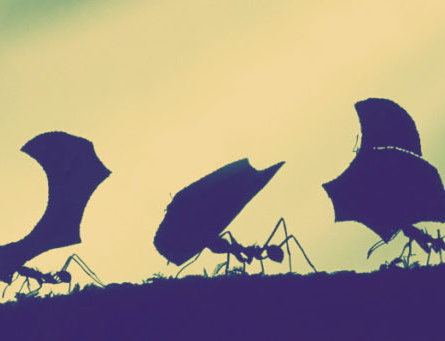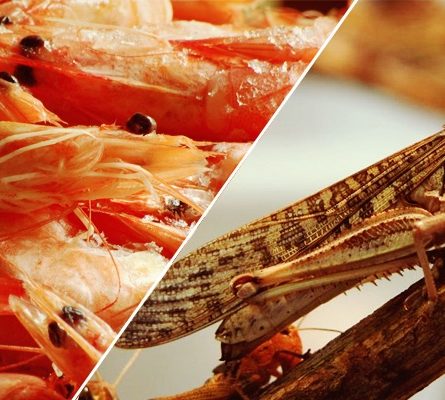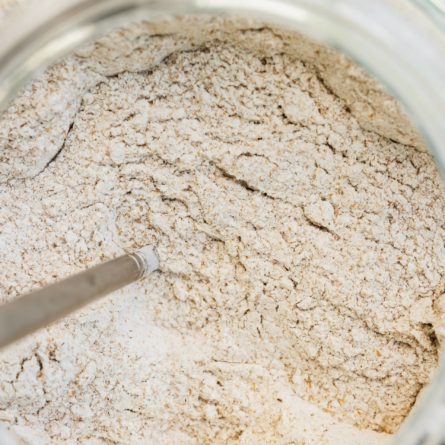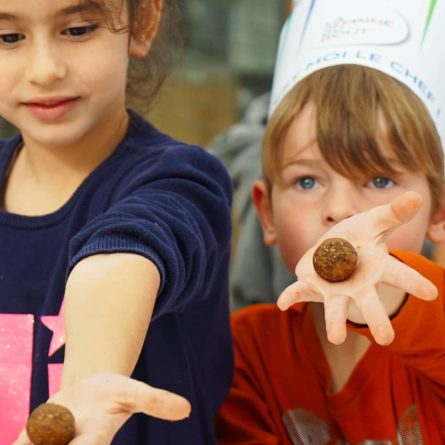In August this year, Florian travelled to the conference Eating insects in Athens. He had the pleasure to meet with Valerie Stull a recent PhD doctor -w(o)rm congrats by the way- working for the Center for Sustainability and the Global Environment at the University of Wisconsin, Madison USA. Valerie is specialized in the consumption of insects in Africa and in the United States of America.
1.Can you sum up the object of your study and the main findings?
Nowadays, there are lots of studies quantifying zinc, proteins and other nutrients present in edible insects. However, I personally wanted to look at the direct health impact of eating insects. Insects contain dietary fiber in addition to other important nutrients, and I was curious about the influence and benefits of insect fiber for our body and well-being. This is why I decided to organise a double-blind, randomized, crossover trial. In other words, we tested, on a sample of 20 Americans, the effects of an insect diet compared to a non-insect diet. We asked a random part of the sample to eat 25g of cricket powder with their breakfast for 2 weeks. In the meantime, the other part of the group would eat a non-insect breakfast. After a two weeks wash-out period, they would switch. At the end of the 6 weeks trial, we were able to draw some conclusions.
First, we were happy to observe that there were no metabolic risks as we did not find any signs of toxicity, intolerability, or digestive problems associated with
eating crickets… Importantly, we did note some small changes in the quantity of several bacterium present in stool samples from participants after
eating cricket. For instance, Bifidobacterium animalis, a probiotic bacterium, increased significantly, compared to the control. In conclusion, this this clinical trial generated positive results and indicated that cricket consumption was good for the health of this small population. Of course, we would need more research to claim this with more
certainty, but it is very positive for a pilot test.
2. Since when are you interested in insect food and do you remember why?
Yes, this is all very clear in my mind. I was 12 o 13 when I travelled with my family to Central America. I was offered fried ants. Of course, I was a bit nervous about it. But after putting an ant in my mouth, I quickly realized it tasted like food.
Of course cause it is food 😀
It was kind of a revelation, as it is not in our food culture in the United-States. A few years later in 2013, I discovered the FAO report about the interest of insects as food. I entered a competition with a friend about this subject and then, I went on to complete my PhD on the topic and it is now my career. I was curious about the lack of knowledge and research
on the subject, as well as the huge western bias we have.
3. Can you explain your experience in Zambia, Africa? What did you do over there? And why did you choose this country?
I spent a year in Zambia trying to understand how people live with, experience and consume edible insects. I was doing a cultural and social study about the perception of edible insects in Africa. I also tried to understand their interest in farming insects as nowadays almost 92% of the edible insects consumed in Zambia, are harvested in the wild.
I decide to go to Zambia for 3 reasons. First of all, eating insects there is very common as there are more than 80 edible species consumed eaten over the country. Also, the country is very vulnerable to food insecurity and undernutrition. Finally, I had good connections in Zambia as I already worked there.
4. How did you gain trust with this population? And was it hard to adapt?
I found it difficult to be an outsider when I needed to understand something very personal. I worked to gain the population’s trust while listening and giving time. Each time, I entered
a community, I sought out a leader that could recommend me. Also, I spoke separately to women and men. I found out that it was easier to get everyone’s opinion this way. Also, generally women are a bit more active in insect harvesting and in decision making about what to cook for the family.
5. According to you, what are we going to eat in 2050?
In America, I imagine we will begin to eat more sustainable and local products as people become more and more interested in the origin and environmental impact of their food. Also, I hope we will eat more insects but I think it may take more than 30 years for insects to be mainstream.
Finally, I really believe that more fish and chicken will be fed with insects in the United States in the near future..
6. How do you act daily to have a lower environmental impact?
I am entotarian, meaning the I am a vegetarian eating insects and not eating meat, most of the time. In the US, I eat mealworms and crickets, which are easier to find. I like to add insect powder to my smoothies in the morning. But back in Zambia, it was easier to find fresh caterpillars, termites, and many other delicious insects.
To your opinion, what was the main stake of Athens conference?
Unlike other events, we really wanted to gather in the same place very different people working in the insect field. For instance, we’ve been able to meet scientists, industry actors as JIMINI’S, chefs, artists, educators etc. We gave the opportunity to all these people to interact, exchange, and talk about insect food. This enables to work together as we have the same objective: make people discover, like and eat insects.
Some bonus questions about edible insects and more:
- With whom do you dream to grab a grub? Probably Arnold van Huis, professor of Entomology at Wageningen OR Barack Obama
- A song that gives you the cricket power? The Man – Feel It Still and Mimicking Birds – Sunlight Daze
- What is your favourite insect? Flying ants in Zambia—so delicious!
- And in our range of products? I loved the sweet mango cricket as i am not used to associaty insects with sweet flavours
SCIENTIFIC REPORTS paper out! – Impact of Edible Cricket Consumption on Gut Microbiota in Healthy Adults, a Double-blind, Randomized Crossover Trial https://t.co/K23oj0VGeI
— Valerie Stull (@_vstull_) July 17, 2018





Wees de eerste die een opmerking achter laat